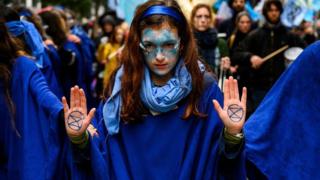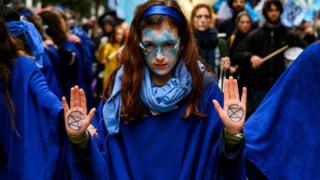Climate change: Major emitters accused of blocking progress at UN talks
Brazil, China, India and Saudi Arabia are criticised as anger grows at a UN climate change meeting. …

 Image copyright Getty Images
Image copyright Getty Images Delegates from developing countries have reacted angrily to what they see as attempts to block progress at the COP25 meeting in Madrid.
One negotiator told the BBC that the talks had failed to find agreement on a range of issues because of the blocking actions of some large emitters.
Carlos Fuller from Belize said that Brazil, Saudi Arabia, India and China were “part of the problem”.
Other observers said there was a serious risk of failure at the talks.
Ministers from all over the world have arrived in Madrid for the high-end negotiations that will determine the final outcome of this conference.
Despite a huge climate demonstration on the streets of the Spanish capital last Friday, hopes of an ambitious declaration at COP25 have smacked straight into the realities of politics and entrenched positions.
The central aim of the meeting is to “raise ambition” and set out a plan by which countries will put new climate pledges on the table before the end of next year.
But already there are signs that some major emitters are trying to limit the scale of what can be achieved in Madrid.
“There’s an effort right now to block the words ‘climate urgency’ in text from Brazil and Saudi Arabia, saying we haven’t used these words before in the UN, so we can’t use them now,” said Jennifer Morgan, executive director of Greenpeace International.
“This gap between what’s happening on the outside and what’s happening in the science, and this ‘UN speak’ that won’t react and drive something is very frustrating.”
Negotiators have told the BBC that the obstinacy of some countries was limiting agreement on non-contentious questions.
“I am very disturbed and angry,” said Carlos Fuller, the chief negotiator for the small island developing states group of countries.
“At 2.30 this morning we couldn’t agree to continue working on a transparency framework, that tells the world what each country is doing, we couldn’t agree to keep working on it. That is ridiculous”
One issue that has caused a good deal of anger are the attempts by Brazil, China, India and Saudi Arabia to have the actions that were due to be completed before 2020 by richer nations, re-examined as part of the overall deal here in Madrid.
Carlos Fuller says that this sort of backward focus by these major emitting countries doesn’t help anyone to make progress.
“They are part of the problem, they are looking too much backward to say that the developed countries have not done what they should have done and hence we are not going to do the same thing,”
“I disagree with that totally. We are all on this one planet together. We need to recognise the mistakes of the past and not replicate them.”
Mr Fuller said this “game of chicken” approach to the negotiations was a threat to the overall success of the talks.
The mood among many campaigners is low as there seems to be little hope of progress on the two major outstanding issues that need to resolved here. These are the question of carbon markets and the issue of loss and damage.
One of the key questions on carbon markets is the question of carrying over old credits. Some believe that if efforts by Brazil and others to carry forward billions of credits created under older, discredited schemes are successful, they could “bankrupt” the entire Paris pact.
There were some positive signs in the conference with US presidential candidate Michael Bloomberg telling the meeting that his first action if he gets elected would be to re-join the Paris agreement.
While there are still several days to go, there is hope that the presence of political figures such as Mr Bloomberg and new announcements by the European Union and others will help foster an ambitious agreement.
But there is also deep concern that this might not happen.
“I hope that they support a coalition of countries that beat back the darker forces here in Madrid that want to hold the world back,” said Jennifer Morgan from Greenpeace.
“If not, it will be a moral failure,” she said.
Follow Matt on Twitter @mattmcgrathbbc


